An LAPD helicopter claimed to have ID'ed protesters from above and threatened to "come to your house"
-
Not good enough. Phones can figure out its location using gyroscopes and accelerometer, then if at any point in the future, you remove it from the faraday cage, your entire movement logs are transmitted.
I don't think their gyroscopes are good enough for that level of inertial navigation. You could just fling it around tossing it up in the air and down again, that would totally mess with its navigation.
The far greater threat is that you just have the phone taken off you. For that reason alone you should use a burner, but I don't think you should be worried that they can track you based on gyroscope history.
-
The reason it being turned off matters is because LE has a significantly more difficult time extracting data from that state. And again, a proper faraday bag prevents signal leak.
You guys are welcome to do what you want, I'm just explaining the best way to stay safe if you don't want to leave your phone at home. There are plenty of legitimate reasons someone may want one as a lifeline just in case.
My concern would be that the police would confiscate my phone. Not that they would necessarily be anything on it, but I don't want them to have my nice expensive phone. They can have this crappy cheap one instead.
-
Did you hear that from the president and the press? Or just random assholes on the internet?
All of the above
-
Just go out wearing a MAGA hat. They only have small brains it'll probably confuse them.
Like how insects are always pretending to be wasps so they don't get eaten, see it's scientific.
Or even just dress how they'd expect their own to dress, don't even need a dumbass hat. I wear an old tan leather jacket and a Swedish combat cap which apparently translates to friend for them. Also applies to the anarchists though, they see my clothes as friendly.
-
Cool...
This one goes out to all the small government, privacy loving, Republicans out there, supposedly hating invasive big brother tactics and representing the values of the American heartland.
Would be much appreciated if you could have a word with your people about this.
One wonders just how viable the Ukranian strategy would be to take out LAPD choppers (when landed, of course).
-
I would be shocked if they aren't equipped with puke bags for such an event and then your plan is foiled.
-
I bring my phone. I likely won't be breaking any laws, and I can afford a lawyer. So yeah arrest me and waste the system's time. Just another data point they have to sort.
And if it gets to the point where none of that matters we were cooked anyway
Police issues a dispersal order, but blocks all routes to safely leave the area.
Congratulations, you will now be charged as having committed a crime and good luck proving in a court that there was no realistic option for you to leave.
Also police seizes your phone. Congratulations now they access your data and either go after people you have had contact with or they claim you to be part of a criminal organization as they pin other charges on people they found a connection with.
-
Not good enough. Phones can figure out its location using gyroscopes and accelerometer, then if at any point in the future, you remove it from the faraday cage, your entire movement logs are transmitted.
Phones can figure out its location using gyroscopes and accelerometer
This is plainly false.
The error stack-up from the imprecision of a phone's MEMS sensors would make positioning basically impossible after a couple of dozen feet, let alone after hours of walking around.
There are experimental inertial navigation systems that can do what you describe, but they use ultra sensitive magnetometers to detect tiny changes in the behavior of laser suspended ultra cold gas clouds that are only a few hundred atoms large. That is not inside your phone.
-
You won't have much of a choice when FEMA is gone. I mean, less and less people will have homes there anymore.
Right, because nobody lived here prior to the existence of FEMA.
I, for the life of me, cannot understand how people can look at the history of what our, and most other governments have done, and then say, "Hey, you know what? We need more of that!"
-
Police issues a dispersal order, but blocks all routes to safely leave the area.
Congratulations, you will now be charged as having committed a crime and good luck proving in a court that there was no realistic option for you to leave.
Also police seizes your phone. Congratulations now they access your data and either go after people you have had contact with or they claim you to be part of a criminal organization as they pin other charges on people they found a connection with.
I doubt they will find anything of use. The most powerful thing I can do is slow them down. It's the best use of my privilege
-
Lawyers operate in courts. We don’t have due process anymore.
Then as I said we're already cooked. But also that is demonstrably false anyway. Our judiciary is under heavy threat, but still functioning
-
That gives me a good idea. A week before the protest buy burners, use them frequently near republican supporters' house, go to a protest, use your phone all the time in the protest, dump them near the police, let them enjoy the fruits of the regime they supported.
Diabolical.
In theory, of course. Definitely just in theory. -
Phones can figure out its location using gyroscopes and accelerometer
This is plainly false.
The error stack-up from the imprecision of a phone's MEMS sensors would make positioning basically impossible after a couple of dozen feet, let alone after hours of walking around.
There are experimental inertial navigation systems that can do what you describe, but they use ultra sensitive magnetometers to detect tiny changes in the behavior of laser suspended ultra cold gas clouds that are only a few hundred atoms large. That is not inside your phone.
You seem to know a lot about this. I'm just generally fascinated by this method of tracking. Would the sensors ever become accurate enough in the future? Or is there a limit to their accuracy due to physics with a small sensor?
-
Right, because nobody lived here prior to the existence of FEMA.
I, for the life of me, cannot understand how people can look at the history of what our, and most other governments have done, and then say, "Hey, you know what? We need more of that!"
Yeah, it's not like there's a reason fewer and fewer insurance companies will write a policy in that state every year. It's not like the property insurance rates are the highest in the country.
-
Cool...
This one goes out to all the small government, privacy loving, Republicans out there, supposedly hating invasive big brother tactics and representing the values of the American heartland.
Would be much appreciated if you could have a word with your people about this.
Green lasers. Everybody should have one.
-
That gives me a good idea. A week before the protest buy burners, use them frequently near republican supporters' house, go to a protest, use your phone all the time in the protest, dump them near the police, let them enjoy the fruits of the regime they supported.
Gotta clean and sterilize them.
-
Having a small faraday bag around is useful too, that's what I do.
Faraday bags do not work with 5G
-
That burner cant ever have connected to a cell tower when its near your house, otherwise its not longer a "burner"
Edit: Also: Beware of the possibility of there being malware that logs gyroscope and accelerometer data. Those info can be used to figure out your location, then transmitted whenever it has a chance.
Gyro/accelerometer data isn't accurate enough to do that. Small errors in the data add up and will quickly drift away from the actual location. You can use it for video game controllers, but not tracking over large distances. Edit: there's a reason the best VR tracking often uses external methods, not controllers alone.
But most phones have GPS and that's where the real problem is.
-
Faraday cage does not prevent gyroscopes and accelerometers from working. Then if you remove it from a faraday cage in the future, it will transmit all that movement
Since you're posting this all over the thread, I'll also have to repeat the information that gyro/accelerometers are not capable of doing that. Small measurement errors stack up and throw it completely off.
-
Police issues a dispersal order, but blocks all routes to safely leave the area.
Congratulations, you will now be charged as having committed a crime and good luck proving in a court that there was no realistic option for you to leave.
Also police seizes your phone. Congratulations now they access your data and either go after people you have had contact with or they claim you to be part of a criminal organization as they pin other charges on people they found a connection with.
This is the sort of nuts and bolts of protesting that Americans are learning the hard and fast way.







